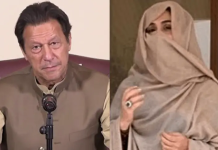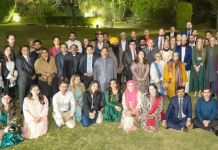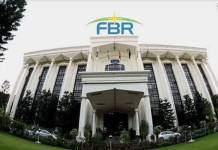Justice Isa stated he did not consider “this bench a bench”
Shujaat Hamza
ISLAMABAD: The Supreme Court (SC) on Thursday sought the record of all those arrested in the country post-May 9, when violent protests broke out in the country following the arrest of PTI Chairman Imran Khan.
The directives came as a newly formed seven-member bench, down from a nine-member bench, resumed hearing a set of petitions challenging the trial of civilians in military courts.
Earlier, a nine-member bench comprising Chief Justice of Pakistan (CJP) Umar Ata Bandial, Justice Isa, Justice Masood, Justice Ijazul Ahsan, Justice Syed Mansoor Ali Shah, Justice Munib Akhtar, Justice Yayha Afridi, Justice Sayyed Mazahar Ali Akbar Naqvi and Justice Ayesha Malik had taken up the case.
However, Justice Isa had stated that he did not consider “this bench a bench”. He also said that he could not be a part of any bench until the case relating to the Supreme Court (Practice and Procedure) Bill 2023 — which aims to deprive the office of the chief justice of Pakistan (CJP) of powers to take suo motu notice in an individual capacity and which has since become law — was decided.
At the same time, he said that he was not recusing himself from hearing the case. Justice Masood had agreed with Justice Isa’s views.
The hearing was subsequently adjourned after all the judges left the courtroom. However, CJP Bandial decided to move forward with hearing the case and formed a fresh seven-member bench, excluding justices Isa and Masood.
The petitions in question were filed by former CJP Jawwad S. Khawaja, Aitzaz Ahsan, Karamat Ali, and PTI Chairman Imran Khan.
Khawaja, who filed the petition through his counsel Advocate Khawaja Ahmad Hosain earlier this week, requested the top court to declare the trial of civilians by military courts unconstitutional.
The former CJP pleaded that Section 2(1)(d)(i) and (ii) of the Pakistan Army Act were inconsistent with the fundamental rights conferred by the Constitution and therefore void, and should be struck down.
As an interim measure, all proceedings against civilians based on the sections should be suspended or, in the alternative, any military court should be restrained from passing a final order in any case against civilians based on the sections, the petition stated.
Before this petition, five members of civil society from different cities, through their counsel Faisal Siddiqi, sought as illegal the trial of civilians in the military courts in connection with the violence in the country of May 9.
Likewise, Ahsan, who has also served as a former law minister and also spearheaded the 2007 lawyers’ movement, explained that the primary purpose of his petition was to ensure that none of the thousands of civilians who have admittedly been arrested for allegedly having partaken in the May 9 violence and being nominated for trial be tried by military courts.
The petitioner said he did not seek to scuttle the trial of any civilian before any lawfully established court of criminal jurisdiction.
In his petition, the PTI chairman sought a declaration against the arrests, investigation, and trial of civilians in peacetime under the Pakistan Army Act (PAA) 1952 as well as the Official Secrets Act 1923.
As the hearing began, Justice Shah said that anyone who had reservations regarding the seven-member bench should make it known right away.
Ahsan and Attorney General of Pakistan Mansoor Usman Awan stated that they had no objections.
CJP Bandial said that some benches use to go to the provincial registries during court holidays. “Keep all these things in mind,” he said.
The PTI chairman’s lawyer, Shoaib Shaheen, said that some objections were raised on their petition. The CJP responded saying there were certain things of a “political nature” included in the plea.
“We don’t want to hear that right now. Right now the focus is military courts,” Justice Bandial said.
Shaheen, however, urged the court to include the PTI’s plea among those being heard. CJP Bandial responded by stating that the court would see.
Ahsan’s lawyer Latif Khosa then began his arguments and said that after invoking of Article 245, the high courts’ jurisdiction under Article 199 had ended. However, Justice Afridi pointed out that the notification for the requisition of armed forces had been recalled.
Khosa then said that the Formation Commanders’ Conference had stated that there was “irrefutable evidence” regarding the events of May 9.
“Did the press release say trials would happen in military courts due to irrefutable evidence?” CJP Bandial asked, to which Khosa replied in the negative.
The lawyer then proceeded to read the handout issued after the meeting out loud in court, at which the CJP told him to only read out the relevant paragraph. “The relevant paragraphs states that the perpetrators will soon be brought to justice under the Army Act,” Khosa said.
Justice Bandial then asked whether the trials of civilians in the country’s military courts had commenced.
Khosa responded by saying they had started. The lawyer also highlighted that the handout issued by the National Security Committee also talked about “irrefutable evidence”.
“Either a colonel or a brigadier will conduct the trial of a civilian,” he said.
The lawyer further said that the federal cabinet had also endorsed the statement issued by the Inter-Services Public Relations (ISPR) in this regard. “The country’s military leadership gave a unanimous decision that there is irrefutable evidence,” he said.
“The Formation Commanders’ Conference said there is irrefutable evidence so how will a colonel issue a different verdict during the trial?” he asked. At the same time, he made it clear that he was not asking for the perpetrators to be released.
“I have no sympathy for those who attacked military installations,” Khosa said. Those who have committed crimes should be punished in accordance with the law, he said.
However, Justice Shah urged the lawyer to show the court that trials in military courts had in fact begun. Khosa then read out the verdicts issued by anti-terrorism courts for handing over suspects to military courts.
Justice Shah then asked if any of the affected persons had moved the apex court. “I have no such information,” Khosa responded.
Justice Afridi then wondered if anyone had challenged the laws under which trials were to be conducted in military courts. “Can the laws regarding military courts be challenged?” asked Justice Ayesha.
“Who will listen to a case against the Army Act and the Official Secrets Act?” Khosa asked.
Justice Ayesha then asked the lawyer to apprise the court about the Army Act and the rules of military courts. Justice Afridi also asked Khosa to inform the court about the names of those sent for trial under military courts.
Justice Naqvi said that the anti-terrorism courts were already empowered to hear the cases that had been registered.
“That is also our argument: cases should be heard in anti-terrorism courts, not military courts,” Khosa said. He said that around 9,000 people were arrested “under the pretext of May 9”.
CJP Bandial, however, said that the court wanted to stick to the facts. He said that countless names were included in the cases that were registered. “Why were the names of some policemen included in the cases?” he asked.
“How many people were booked and how many were arrested?” Justice Shah also asked.
Khosa said that around 4,000 people were arrested across the country on May 10, adding that cases were registered against PTI’s Shah Mahmood Qureshi, Murad Saeed and Hammad Azhar.
Justice Shah said that a request is given to the court or the magistrate regarding trying civilians in military courts. He said that the courts may have had a reason for allowing the cases to be transferred.
“If the Army Act does not apply to civilians, how did anti-terrorism courts allow the cases to be transferred to military courts,” asked Justice Ayesha.
“Under which law or reason was permission given to transfer civilians’ cases to military courts?” Justice Shah asked.
Justice Afridi also pointed out that the documents Khosa had attached with Ahsan’s plea were incomplete. He again asked the lawyer about the number of cases sent to military courts.
“Ten people from one place, 20 from another [have been sent],” Khosa said.
Justice Afridi responded by saying that the lawyer was giving arguments of a “general nature”.
Justice Shah also asked if a discussion had taken place in the anti-terrorism courts earlier regarding trying suspects in military courts.
Advocate Khosa replied that in several instances neither the suspects nor their counsels were present in the courtroom.
“Will the prosecution then challenge such a decision?” the judge inquired, to which Khosa said that his case was about not trying civilians in military courts.
Here, Justice Akhtar asked, “Can the case be heard in the anti-terrorism courts under the Official Secrets Act?”
Advocate Khosa replied in the affirmative.
Meanwhile, Justice Ayesha remarked that only “their own people” could be tried in military courts, adding that the same was not applicable to civilians.
“This is exactly what our case is about. Trials of civilians cannot be held in military courts,” Khosa said.

















